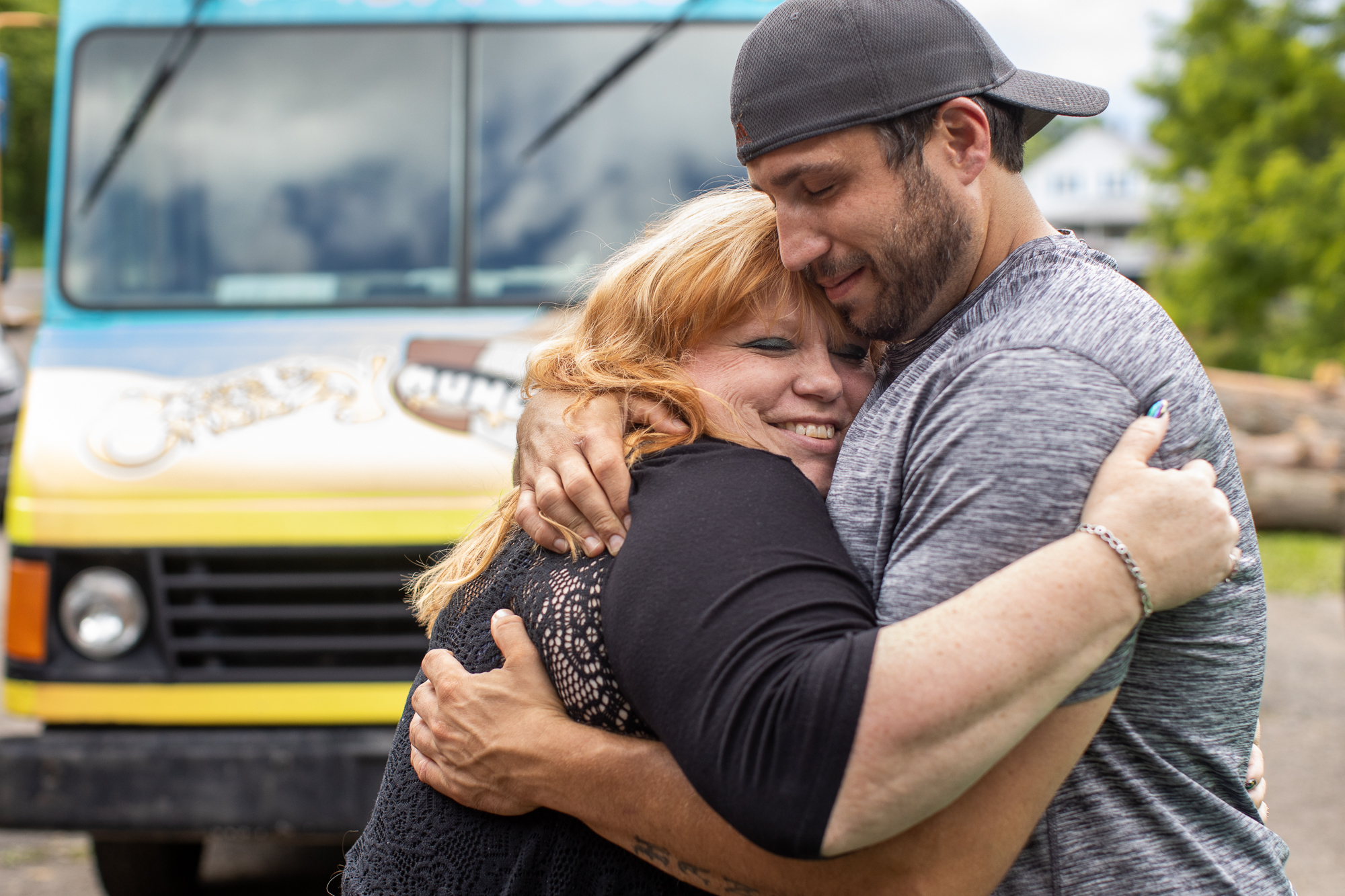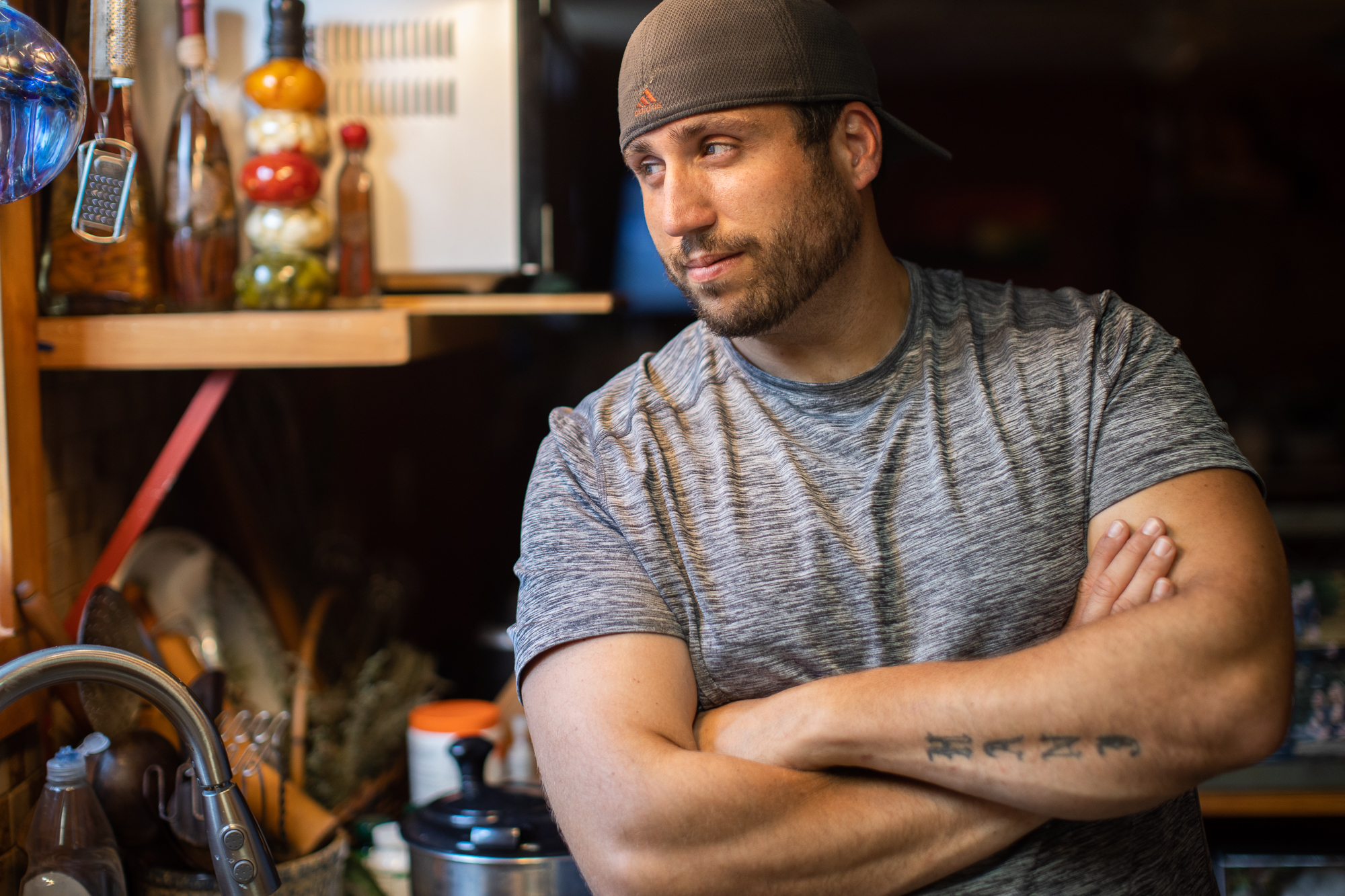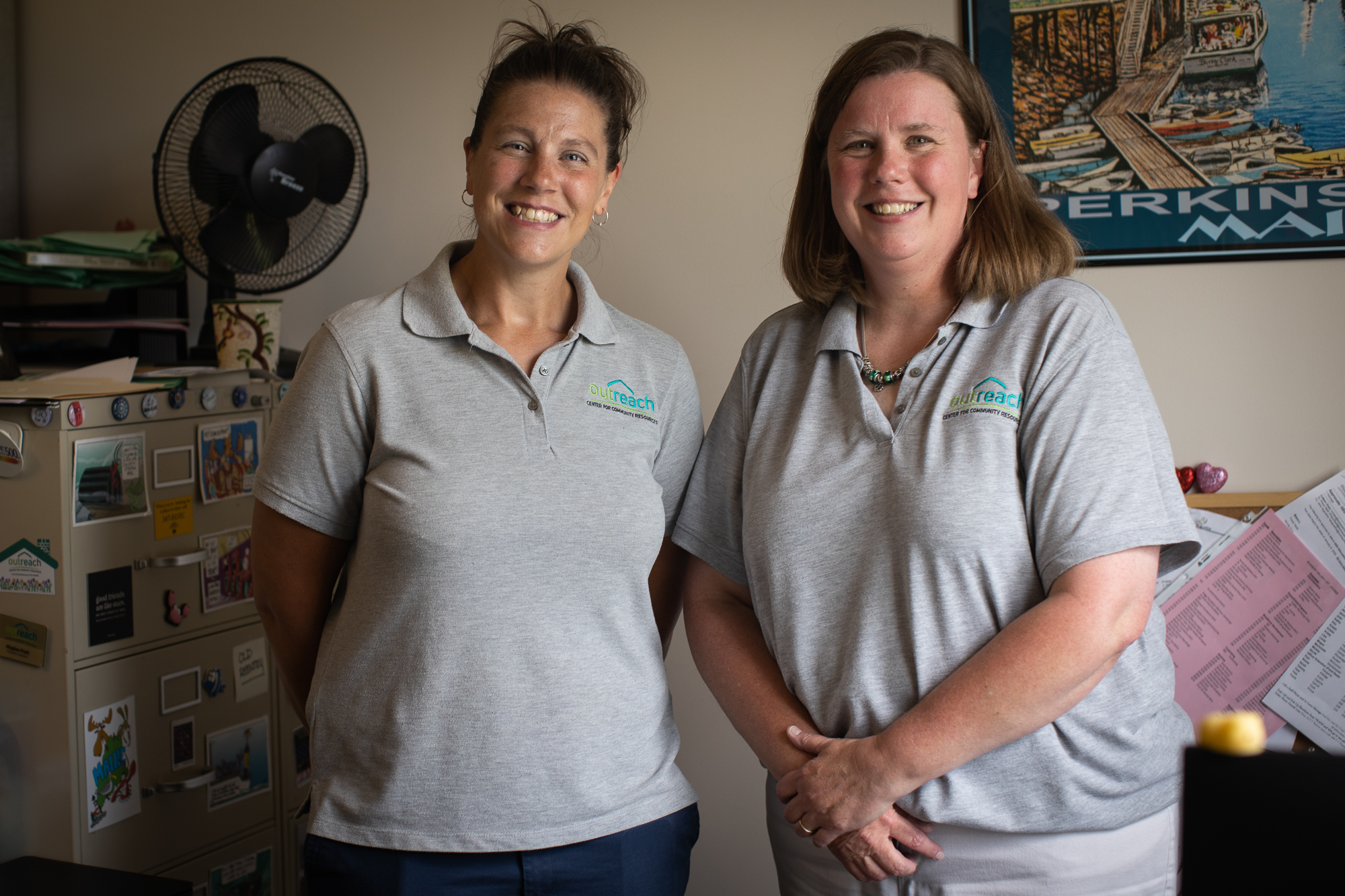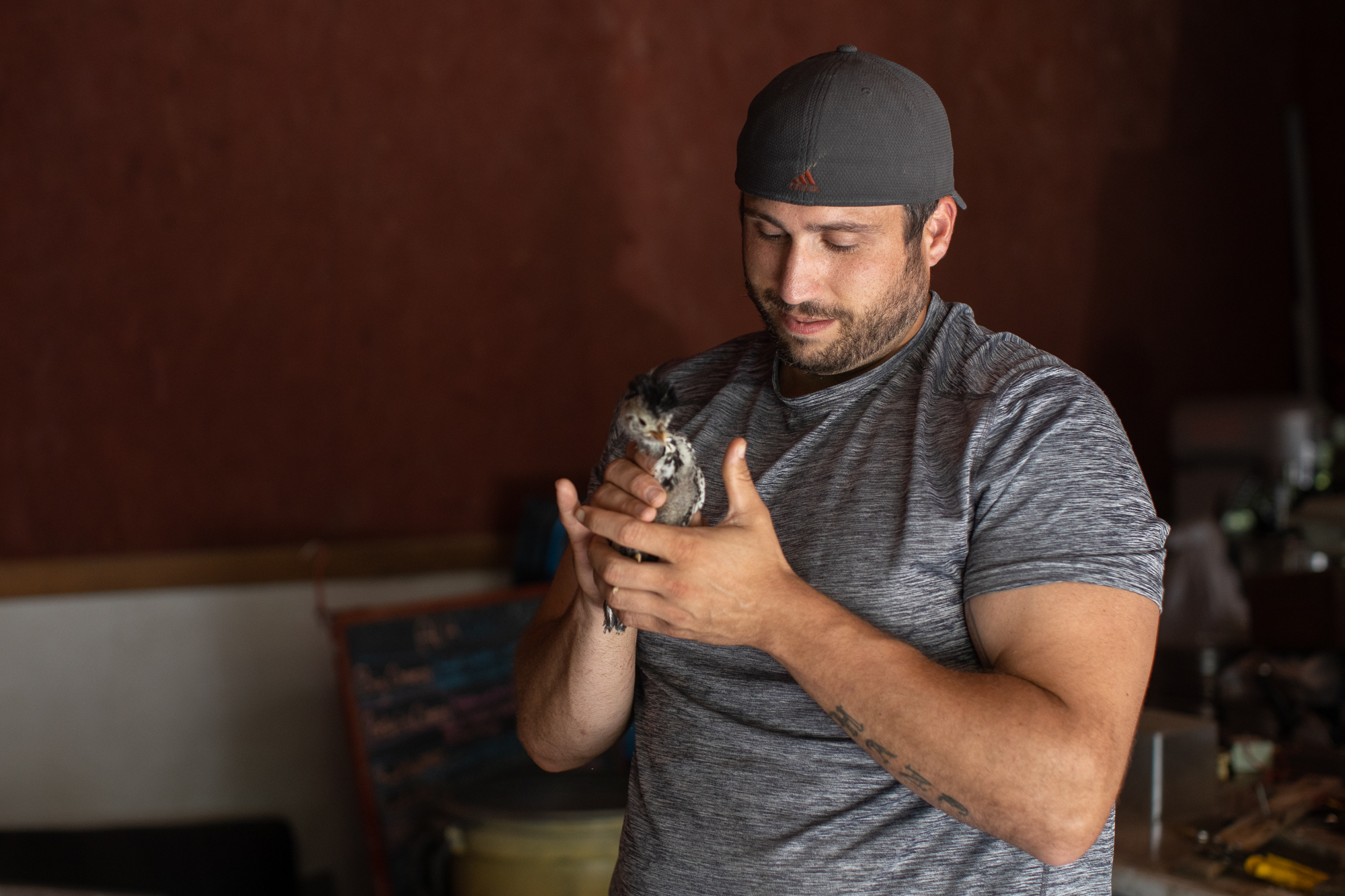While James Hanjaras was in prison, his grandmother visited him regularly and reassured him with one of her favorite expressions, “This too shall pass.” He treasured her words so much that he traded a man seven honey buns to tattoo the phrase on his forearm using a sharpened staple from a Catholic devotional booklet.
Hanjaras was released from prison in late January, after completing an in-patient drug rehabilitation program and serving a 21-month sentence for drug-related charges.
“Prison changed me, for sure, and it changed me for the better. I definitely don’t want to go back. It sucks,” Hanjaras says. “But you know, it turned me into the person I think I’ve always been. I just couldn’t realize it before because I was always high.”
Focusing on his grandmother’s words helped Hanjaras through challenging times, and he looked for ways to stay busy and productive inside Lackawanna County Prison in Scranton, Pennsylvania. That’s how he found a series of courses offered by the Outreach Center for Community Resources.
Founded in 1988, Outreach provides a variety of programs to promote family stability and economic self-sufficiency. In addition to employment training and workforce development, the organization offers resources in areas like life skills, literacy, parenting, behavioral health, early childhood education, and youth mentoring.
After a fellow incarceree told him about Outreach, Hanjaras signed up for every course they offered inside the prison. The topics ranged from anger management and communication to critical thinking, wellness, and parenting. Outreach program managers Jennifer Shoemaker and Jane Augustine teach the classes and work closely with people like Hanjaras during and after their incarceration.
“If we can get somebody in the door, we have that opportunity to help them through the process of thinking about what they’ve been doing and if they should be doing it differently,” Shoemaker says. “And we tell them: We believe that you can do this. You can be a different version of yourself that’s not the individual committing crimes or the individual in your addiction.”
In addition to strengthening valuable life skills, the classes allow counselors like Shoemaker and Augustine to connect with incarcerated people and help them find meaningful employment upon their release.
“You build that trust, and you’re meeting them where they’re at. You’re not criticizing them, you’re not making fun of them, no judgment,” Augustine says. “And you’re saying to them, ‘What do you want to be, and how can we help you get there?’”
The day after he got out of prison, Hanjaras walked about a mile from his halfway house to meet with Shoemaker and Augustine at the L.E.A.D. Center, which provides resources, like access to computers, a curated list of job openings, resumé assistance, and interview skills coaching. He wanted to find work as soon as possible, and they were eager to point him in the right direction.
“The only thing you can do in prison is work on yourself. Whether that’s reading, exercising, or going to these classes. And I’m telling you, the classes helped me so much,” Hanjaras said. “They really helped me get me back on track and realize the possibilities of a sober life, which is something I’d never had.”
Now 33, Hanjaras was 15 when he started using drugs. He grew up in a rural community called Brooklyn Township, about 35 miles north of Scranton. Since he was a boy, he’s had a love for food and an interest in cooking, which he credits to his mother. One of his earliest memories is the time she gave him stuffed mushrooms and rumaki to try. He was about two years old.
“Rumaki is bacon-wrapped chicken livers,” Hanjaras says. “That was one of my first culinary experiences, and I still remember it to this day. Her feeding that to me, it meant a lot.”
Hanjaras started taking kitchen-skills classes through his high school’s vocational-technical program, then went on to study hospitality management and culinary arts at Pennsylvania College of Technology. He served as a cook in the National Guard to help pay for his education and operated an excavator for an oil and gas company before deciding to open a food truck in 2013.
He named it Muncheeze, and served gourmet grilled cheese sandwiches. James says business took off quickly, but through it all, he was abusing drugs regularly, particularly opiates.
“The way I used drugs was, if I had a crappy day at work, I’m definitely getting high. If I had a great day at work, I’ve got the money, let’s go get high,” Hanjaras says. “ If I was just having a regular day, I was getting high. There was no differentiating factor.”
Hanjaras has been sober since completing an in-patient rehabilitation program. “Addiction is a very powerful thing. Even right now it’s like meth and cocaine and opiates are right outside the window, just waiting for me to come back,” he said. “They’re never going to stop. That’s why I need to stay focused and stay on task and just keep doing what I’m doing.” [Photo by Jim Tuttle]
Several personal setbacks accelerated his drug use, and Hanjaras began using methamphetamine. He later began selling the drug, and his supplier expected him to move more and more product as time went on. Dealing became his main source of income.
“Then 2017 rolled around, and I took the food truck out maybe three or four times the entire year. I didn’t need to. I made money with the meth, and I was getting high,” Hanjaras says. “If you’re in active addiction and they’re just sending you all these drugs, it’s really hard to say no. It’s really hard to stop and get out of that situation.”
When DEA agents raided his property in December 2017, Hanjaras says they found about five pounds of methamphetamine and $40,000 in cash. As he lay handcuffed face-down on the floor, he remembers feeling a combination of terror and relief.
“I didn’t need to look over my shoulder anymore, because they were right there,” Hanjaras says. ”That was what my life had become — looking over my shoulder, worrying that someone’s going to shoot me, wondering if I’m going to die from this needle in my arm. The paranoia was terrible. And when that happened, it was almost like I could breathe again.”
Prison was terrifying at first. One of the people he met shortly after he arrived was an older man who’d been incarcerated for most of his adult life. He told Hanjaras to put aside any worries about what might be happening in the outside world because there was nothing he could do about it.
“I didn’t have a routine. I woke up, and I was just in a daze. And then I started getting into these classes and getting that structure, and then I started reading and I would read one book a week,” Hanjaras says. “Then I got a job, and it just slowly clicked into place that this routine, this drive, this is what you’re supposed to do. This is how life is supposed to be.”
In addition to the classes offered by Outreach, Hanjaras filled his time by working. After a brief stint in the main cafeteria kitchen, he was promoted to overnight cook for the Officer’s Dining Room. Considered one of the most prestigious inmate jobs, the position paid the highest rate possible — $5 per day. By the time he was released, Hanjaras had saved more than $700.
“James is lucky. He has a good family, and they’ve been supportive,” Shoemaker says. “But we do run into so many people [whose families are] no longer in their life. They’re sick and tired of them going to jail, coming out, going back to jail.”
Pennsylvania’s overall recidivism rate is about 54 percent, Augustine says. The recidivism rate in 2019 for people who participated in Outreach’s program was about 31 percent.
Outreach program managers Jennifer Shoemaker (left) and Jane Augustine work with people in and out of the prison system to hep them find sustainable employment. “I think the reason why we do what we do is because we get to meet all sorts of great people that we probably never in our lifetimes would have come in contact with,” Augustine says. “And as much as they change their own lives for the positive, they change our lives too.” [Photo by Jim Tuttle]
“There’s that stigma out there that people in jail are these horrible people, or if somebody has a substance abuse disorder, they’re a junkie,” Shoemaker says. “They’re just regular people that made a bad choice, and a lot of times the bad choice was out of desperation. Nobody planned to be there, and they sure as heck are looking for someone to help them figure out a way out. That’s kind of where we step in.”
When he showed up at the L.E.A.D. Center in early February, Hanjaras wanted any job he could find, just to keep a routine going. He hoped for culinary work, but had no expectation he would find it right away.
Knowing that Hanjaras loves cooking, Shoemaker had been on the lookout for a job opportunity that would be a good fit. Because of his past struggles with addiction, it was also important to find an environment with fewer relapse triggers than might be found in a typical restaurant or bar. Through a friend, she came across a new business in Scranton called Meal Prep Grind.
Founded by two chefs with a focus on healthy food and fitness, Meal Prep Grind provides home-delivered, prepared meals ready to heat and eat. When Shoemaker reached out, she learned they were having trouble finding reliable workers for their kitchen and were open to interviewing someone who had been incarcerated.
“I felt confident sending him there, knowing it was probably a very healthy environment,” Shoemaker says. “I said, ‘James, if you’re up for it, we’re going to set you up. Let’s call them.’ And he was like, ‘Yeah, let’s do it.”
They worked on his resumé and talked about interview skills before Hanjaras had to go back to the halfway house. The next day, another counselor from Outreach drove him to the interview.
“I told him I was in a halfway house. He asked me what my charges were, and I told him. He looked at the resumé and hired me right on the spot,” Hanjaras says. “Three days after I got out of prison, I had a job thanks to these guys.”
When many restaurants had to close a few months later due to the pandemic, Meal Prep Grind only grew busier. Hanjaras eventually picked up a second job cutting meat at a family-owned butcher shop near his home. He loves that he’s learning and honing new skills there.
Hanjaras has three more years of probation left, but he says it doesn’t worry him. The Muncheeze truck has been parked at his mom’s house since his arrest, and it needs some work to get up and running again. In the meantime, he has two steady paychecks and he’s saving money. He and his girlfriend have their own apartment, and they recently adopted two kittens and a bunch of chickens to raise.
“This is adulting, and it’s great. I’ve never felt this good before,” Hanjaras says. “The possibilities with food are endless. You have the whole world to explore, and now that I’m sober I can do that. I can actually live life.”








